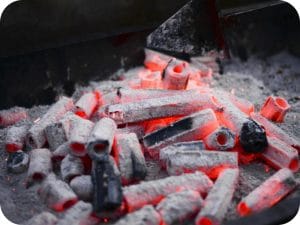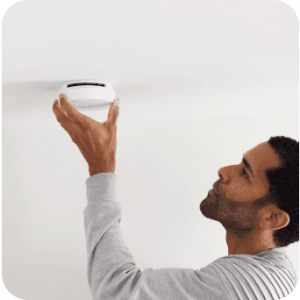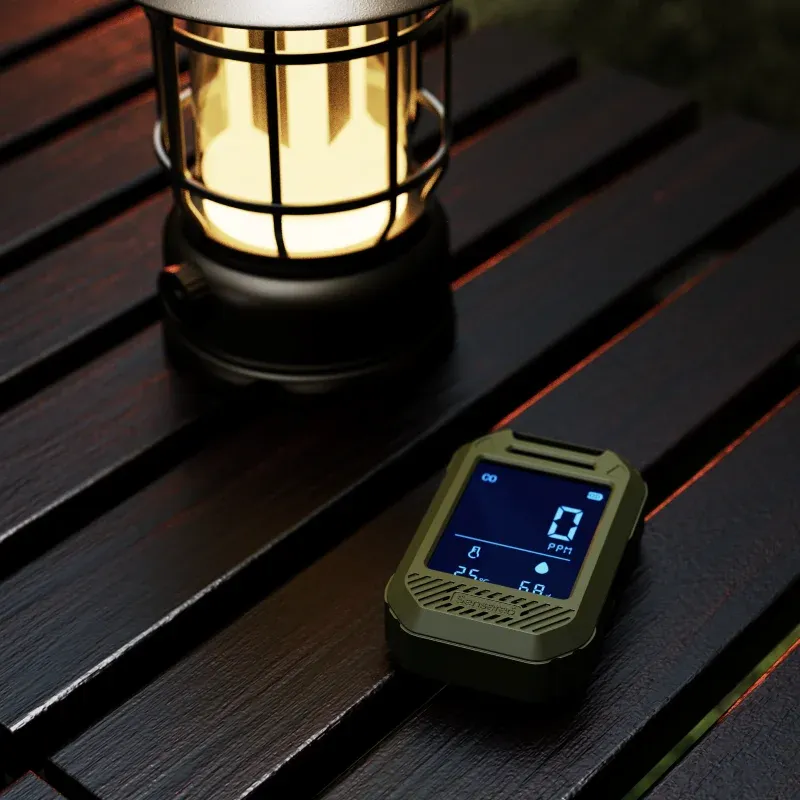Choosing the right carbon monoxide detector is super important for keeping your home and family safe from this “silent killer.” Seriously, carbon monoxide (CO) is no joke. You can’t see or smell it, but it can be deadly. In this guide, I’ll walk you through the differences between battery-powered and hardwired CO detectors. I’ll break down the pros, cons, and what makes them different so you can figure out what’s best for you. Whether you’re after a simple standalone carbon monoxide detector or a complete safety system, knowing your options is the first step.

Quick Peek: Battery vs. Hardwired CO Detectors
| Feature | Battery-Powered CO Detectors | Hardwired CO Detectors (with Battery Backup) |
| Installation | Super easy to do yourself | Probably best to get a pro to install it |
| Cost | Doesn’t cost as much upfront | Costs more to get started |
| Reliability | Depends on how good your batteries are | Usually more reliable, especially if the power goes out |
| Maintenance | Gotta change those batteries regularly! | Gotta test it now and then, replace the backup battery sometimes |
| Power Source | Batteries (AA or Lithium) | Your house’s electricity, plus a battery for backup |
| Best For | Renters or older homes without fancy wiring | New houses or homes that already have the right setup |
Understanding Carbon Monoxide Detector Types
Smoke CO detectors are a must-have in every home, plain and simple. You’ve basically got two main types: battery-powered and hardwired. Oh, and there’s a third type that’s getting pretty popular: smart smoke CO detectors. Knowing what makes them different is key to picking the right one for you.
1. How Battery-Powered CO Detectors Work
Battery-powered CO detectors are easy to install and don’t need to be hooked up to your home’s electrical system. They just run on batteries, which is great if you don’t have the right wiring or you’re renting and need something you can move around. A standalone carbon monoxide detector typically uses AA or lithium batteries, and it’s constantly checking for CO. For many people, doing a DIY installation is the best option.
2. The Tech Behind Hardwired Detectors
A hardwired CO detector plugs right into your home’s electrical system but almost always has a battery backup in case the power goes out. The cool thing is, you can link these detectors together. So if one goes off, they all go off! That way, you’re covered no matter where you are in the house.
3. Smart CO Detectors: The Modern Approach
Smart CO detectors connect to your Wi-Fi and have some cool features, like sending alerts to your phone, talking to you, and working with smart home systems like Google Home and Alexa. This means you can keep an eye on your home’s CO levels even when you’re not there and get a heads-up right away if something’s wrong.
Comparing Installation and Maintenance
When you’re trying to decide between battery-powered and hardwired CO detectors, installation and maintenance are big things to think about. How easy it is to install and what you have to do to keep it running can really make a difference.
1. DIY Installation: The Best Option for a Simple Standalone Detector
Battery-powered CO detectors are pretty straightforward. Usually, you just pop in some batteries, stick it on the wall or ceiling, and you’re good to go (just follow the instructions, of course!). You don’t need to be an electrician, which is why it’s such a popular choice for homeowners and renters.

2. Professional Hardwired Detector Installation
Installing a hardwired CO detector usually means calling in a professional electrician. They’ll connect it to your home’s electrical system and make sure it’s hooked up properly if you have other detectors that are linked together. It might cost more upfront, but you can be sure it’s done right and safely.
Maintenance Requirements for Each Type
With battery-powered detectors, you’ve got to swap out the batteries regularly, usually every six months to a year. Hardwired detectors also need to be tested now and then, and you might have to replace the battery backup every few years. Testing both types regularly is super important to make sure they’re working.
Cost Analysis and Value Comparison
It’s good to understand what each type of detector will cost you so you can make a smart decision for your wallet. Think about how much you’ll pay upfront and what the ongoing costs will be.
1. Upfront Costs: Battery vs Hardwired Detectors
Battery-powered detectors usually cost less to buy than hardwired systems. However, hardwired systems may be more feature-rich and interconnectible, which is really cool.
2. Long-Term Maintenance Expenses
Battery-powered detectors might not cost as much at first, but buying batteries all the time can add up. Hardwired detectors might not need as much maintenance, but getting them installed can be pricey.
Making the Right Choice for Your Home
The best carbon monoxide detector really depends on what you need and what your situation is. Think about your home’s electrical system, how important safety is to you, and where you live when you’re making your choice.
1. When to Choose Battery-Powered Detectors
Battery-powered detectors are a solid choice if you’re renting, if you have an older home without updated wiring, or if you just want a simple, standalone carbon monoxide detector. They’re easy to install and move around.
A Note for Renters: Double-check with your landlord about the rules for smoke and CO detectors in your building.
2. Ideal Scenarios for Hardwired Systems
Hardwired systems are great for new homes, homes that already have linked smoke detector systems, or homeowners who want the extra reliability of a wired connection with a battery backup. A hardwired detector with battery backup makes sure you’re always protected.
For new construction homes: Think about installing linked hardwired systems when you’re building your home for the best safety.
Conclusion
The best choice for you comes down to what you need, what you can afford, and what you prefer. By understanding what makes battery-powered and hardwired CO detectors different, you can make a smart decision and keep your home and family safe.
Shop Our Top-Rated smoke CO Detectors Now




